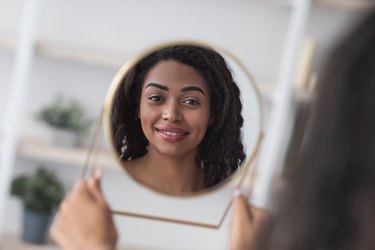
You can't scroll through social media without coming across plentiful posts promoting plastic surgery, fad diets and extreme workouts. Yep, the quest for the "perfect body" is ever-present.
Mainstream media and society in general have been propagating this skinny cultural ideal (and stigmatizing anyone who doesn't stack up to these standards) for decades. But several movements —including body positivity and body neutrality — have emerged to challenge these unattainable and damaging norms.
Video of the Day
Video of the Day
While body positivity and body neutrality both defy the status quo and seek to normalize all body types, regardless of size, shape or weight, their philosophies are quite different.
Here, we spoke to experts to understand the distinctions between body positivity vs. body neutrality (including the pros and cons of each). Plus, we discuss how you can adopt both perspectives to best fulfill your needs.
What Is Body Positivity?
"Body positivity is the idea that our bodies can and should be loved and celebrated," says Tigress Osborn, chair of the National Association to Advance Fat Acceptance.
The body-positive movement — which stems from the fat rights and fat acceptance activism of the 1960s — challenges the thin ideal and asserts people's right to embrace their bodies regardless of size, shape or weight, says Anne Poirier, an intuitive eating coach and author of The Body Joyful.
"The term has been used for decades, but what people often think of as the body positivity movement really grows out of the work of bloggers, Tumblrs and Instagrammers in the early 2000s," Osborn says.
"Those champions of self-love were often people living in marginalized bodies — Black women and femmes, other POC, fat people, disabled people and LGBTQIA folx who created their own visibility on social media at a time when mainstream media was ignoring those communities even more than it does now," she says.
Tip
The term "body positivity" has become popularized in recent decades to the point where you can identify body-positive spaces like gyms and health practitioners through social media hashtags like #AllBodiesAreWelcome.
Pros of Body Positivity
Body positivity can help you develop a healthier relationship with your physical appearance. Here's how:
1. It Validates and Supports Marginalized Bodies
"For many people, body positivity is a loud chorus drowning out the critical voices of media, medical providers, bullies and well-meaning loved ones whose constant criticism tells us literally everything about us is wrong," Osborn says.
In other words, the body-positive movement rejects mainstream cultural standards of beauty and health — which are limiting — and teaches us that our bodies are beautiful just as they are.
2. It Promotes a Positive Self-Image
"Society's ideals have placed a lot of pressure on people to 'look a certain way, weigh a certain amount or be a certain size,'" Poirier says. The result: Most of us experience "I hate my body" moments every day.
But body positivity rejects these unrealistic, unattainable standards, including the idea that thinness equates to attractiveness, and celebrates all body sizes. Learning to praise and revel in your body can lead to more confidence, self-esteem and self-respect, Poirier says.
Tip
These body positivity quotes can provide a starting point for celebrating your body.
Criticisms of Body Positivity
Still, body positivity can have its shortcomings, such as:
1. It Focuses on Appearance
While body positivity promotes self-love, it still emphasizes physical appearance, Poirier says. Focusing on the external package — and not the person as a whole — can still be problematic, especially if you're struggling to achieve warm and fuzzy feelings about your body.
For example, you may feel pressured to fake body positivity and act like you love your body every day. "Body positivity can border on toxic positivity, where people are asked to perform or pretend to love their bodies even if they don't feel that way," Osborn says.
2. It’s Being Co-opted by Privileged People and Corporations
"The movement that was started by people who were truly marginalized has become embraced by many people who are barely at the edge of societal standards, if they're at the edge at all," Osborn says. "Those more privileged people have taken center stage in the movement."
Essentially, those marginalized communities who birthed the movement to give a voice to the unheard are now being disregarded once again.
And to make matters worse, "as body positivity gained in popularity, it got co-opted by corporations and advertising agencies," Osborn says. "Often the same social and financial forces that created the very messaging that made us hate ourselves are now trying to capitalize on our ideas about self-love and self-care in order to sell us more stuff."
3. It Focuses on the Individual vs. the Community
"The movements that inspired body positivity were about access, rights and solidarity, but modern body positivity often over-focuses on the personal," Osborn says. "A de-politicized body-positive movement tells us that individuals feeling good is more important than creating a more accepting and accessible world for all."
What Is Body Neutrality?
The term body neutrality was coined circa 2013 at the Green Mountain at Fox Run Program, a health retreat with a holistic approach to weight, Poirier says.
Unlike body positivity, body neutrality doesn't place prime importance on physical appearance.
Body neutrality "is about seeing our bodies as neither positive nor negative," Poirier says. Instead, it involves having a neutral attitude about your body by viewing it as a vessel in which you experience life.
Put another way, body neutrality lies in the middle of the body image spectrum — a resting place on the continuum toward body positivity, acceptance and love, Poirier says.
Pros of Body Neutrality
Body neutrality can help you develop a more beneficial relationship with your body. Here's how:
1. It Focuses on the Person as a Whole
Body neutrality "concentrates on who we are on the inside, not our external vessels," Poirier says. Taking this perspective helps people realize that they are so much more than just their physical bodies, she says.
And in removing emphasis on our bodies, it allows us to focus on other important aspects of ourselves, Osborn says. We can celebrate and spotlight our strengths that have nothing to do with appearance, including our unique personalities, qualities and traits.
2. It Promotes Self-Acceptance
Body neutrality "encourages us to take an 'it-is-what-it-is' approach to our bodies, accepting changes and challenges without judgment," Osborn says. And in doing so, it also removes the pressure to pretend or perform as if you like your body all the time.
Poirier agrees that body neutrality is more achievable than self-love or body positivity for many people.
This judgment-free perspective also means you spend less energy on negative self-talk and punishing behaviors, which can support a healthier sense of self-esteem and self-respect, Poirier says.
3. It Fosters Gratitude
When we stop criticizing our bodies for what they are not, we can start seeing them in a different light and acknowledge all they're capable of accomplishing.
Body neutrality encourages gratitude for what the body can do, Poirier says. Whether that's giving birth, running a marathon or hugging a loved one, we can learn to appreciate all the amazing things our bodies enable us to experience.
Tip
Regular gratitude practices like journaling can also help you de-stress and break the cycle of self-criticism.
Criticisms of Body Neutrality
Body neutrality isn't perfect. Here are some things to consider:
1. It May Not Promote Personal Growth
While body neutrality is a healthier headspace to hold over body dislike and hatred, "some would say it is a stagnant place to be," Poirier says. That's because it doesn't encourage confidence and self-love in the same overt ways as body positivity.
"Sometimes people misunderstand body neutrality as meaning we should never talk about bodies at all, and this can actually be really problematic for people whose bodies create barriers for them in the real world," Osborn says.
"For example, I want businesses to be neutral in terms of judging my fat body, but I want them to be aware of needs I might have that thinner people don't, like seatbelt extenders or medical equipment meant for my size and weight," she explains.
Tip
Normalizing neutral talk about bodies can help combat weight stigma, which can be harmful to people's mental and physical health, according to Harvard Health Publishing.
Can You Adopt Both Body Positivity and Body Neutrality?
Maybe some days you truly love your body while other days you feel more neutral about it. Luckily, there's no need to pit body positivity vs. body neutrality — it's possible to embrace both at the same time.
"People can absolutely move back and forth [between] positivity and neutrality, depending on what is going on in their own lives and what's happening in the world," Osborn says.
Poirier agrees: "I believe that for many, the first step [toward self-acceptance and love] is neutrality."
Because so many of us have been conditioned to hate our bodies, "body positivity and body love can seem inconceivable and impossible — like something that will never happen," Poirier says.
But by practicing body neutrality, you can slowly work toward body appreciation and acceptance. And in doing so, body positivity may start to feel less daunting and out of reach, Poirier says. "People can take the time they need to shift the way they think about themselves and their bodies."
Still, the goal doesn't always need to be loving your body every single day. It's OK to fluctuate between positivity and neutrality. Give yourself grace — wherever you're at in the moment is good enough.
"What's even better is when people commit to body justice," Osborn says. "The fat liberation movement has taught me that even on days when I feel negative or neutral about my body, I can work toward a world where all bodies are respected. People in all bodies deserve rights, whether we feel meh, bleh or yay about our bodies on any particular day."
Benefits of Body Acceptance
Whether you feel positive or neutral, we can all agree that not feeling hateful or negative about our bodies is a good thing. Here are a few reasons why learning to accept your body is beneficial for your health:
1. It Reduces Stress
So many of us try (and fail) to meet the health and beauty standards of society. When we fall short, our bodies — which don't fit the mold — are often judged and criticized. And this stigma causes stress, which can be damaging to the mind and body.
Body-acceptance movements help people fight stigma and, in turn, help protect them from this stigma-induced stress, Osborn says.
Poirier agrees that body acceptance helps to mitigate the stress and anxiety that people feel about their bodies whenever they engage in daily activities like going shopping, visiting the doctor or applying for a job.
"The fat liberation community and other body-focused social justice movements provide [solidarity,] moral support and practical resources for people who deal daily with a world that expects them to change in order to be treated with love and respect," Osborn says.
2. It Promotes Mental Health
In addition to reducing stress, embracing your body can also help decrease anxiety, depression and disordered eating, Poirier says. Indeed, the more comfortable you feel in your own skin, the healthier you'll be mentally and emotionally.
Body acceptance also improves self-esteem, self-confidence and self-respect, promotes more positive self-talk and can give you a more optimistic outlook on life, Poirier says.
What's more, building a network of loved ones who accept you is equally as important for mental health and wellness. "It's life-affirming to be surrounded by communities of people who love and respect you for who you are, regardless of what your body looks like or what it can do," Osborn says.
3. It Encourages Compassion for Yourself and Others
Body acceptance not only extends to oneself, but to others as well. "More compassion and kindness are the outcomes of this acceptance," Poirier says. Once we learn to treat ourselves better, we do the same for our friends and family as well.
Was this article helpful?
150 Characters Max
0/150
Thank you for sharing!
Thank you for your feedback!


